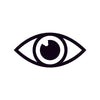What is Hyperopia?
Hyperopia, in other words – farsightedness, is a vision problem where the light is focused behind the retina causing a blurry image. Under normal conditions, the light focused by the eye’s lens and cornea is on the retina. However, a focus exactly on the retina can be a perfect condition which is not usual. The average person is slightly hyperopic, and the hyperopic eye can vary in severity. This common vision problem is seen among a fourth of the population.
Hyperopic people can see distant objects clearly but find it difficult while focusing on objects up close. Hyperopia can also be referred to as ‘hypermetropia’, or longsightedness. You probably know the term as farsightedness, meaning that the person can view things from afar, but struggles to focus on objects closer to them.
How does this affect vision?
It is the effort on focusing relative to the amount of hyperopia you experience that leads to various symptoms. Although a hyperopic person could have normal vision, as the degree of this eye condition increases, it becomes harder for the person to comfortably focus their eyes. Blurry vision for up close objects is caused specifically because of this effort in focusing. This focusing process leads to headaches and tired eyes, especially after a lot of visual work. Reading gets difficult with hyperopia, as can drawing, embroidery, working on detailed models or mechanics and a range of other tasks.
With so many of us needing to sit down at digital screens for hours a day as part of both work and leisure time, those with farsighted vision can quickly become overwhelmed by the extra strain and find their condition worsening. If you do suspect you have hyperopia, due to either your everyday experience or genetic factors, waiting to take action will only risk the problem becoming worse. We need to take care of our eyes as much as possible and address problems as early as we can, in order to enjoy good eyesight even as we age.


